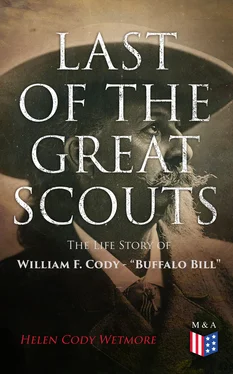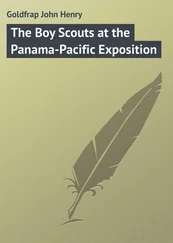"Mercy on us! I thought I was bitten by that fierce dog of yours, Mrs. Cody; but it must have been a burr."
Then the "experiences" would begin. Will always listened quietly, until the folks began telling how wicked they had been before they got religion; then he would burst in with a vigorous "Amen!"
The elders did not know Will's voice; so they would get warmed up by degree as the amens came thicker and faster. When he had worked them all up to a red-hot pitch, Will would start that awful snort of his that always made us double up with giggles, and with a loud cockle-doodle-doo! would bolt from the bed like a lightning flash and make for the window.
So "preacher day," as Will always called it, became the torment of our lives.
To tell the truth, Will always was teasing us, but if he crooked his finger at us we would bawl. We bawled and squalled from morning till night. Yet we fairly worshiped him, and cried harder when he went away than when he was home.
CHAPTER VII. — INDIAN ENCOUNTER AND SCHOOL-DAY INCIDENTS.
Table of Contents
WILL was not long at home. The Mormons, who were settled in Utah, rebelled when the government, objecting to the quality of justice meted out by Brigham Young, sent a federal judge to the territory. Troops, under the command of General Albert Sidney Johnston, were dispatched to quell the insurrection, and Russell, Majors & Waddell contracted to transport stores and beef cattle to the army massing against the Mormons in the fall of 1857. The train was a large one, better prepared against such an attack as routed the McCarthy brothers earlier in the summer; yet its fate was the same.
Will was assigned to duty as "extra" under Lew Simpson, an experienced wagon-master, and was subject to his orders only. There was the double danger of Mormons and Indians, so the pay was good. Forty dollars a month in gold looked like a large sum to an eleven-year-old.
Will's second departure was quite as tragic as the first. We girls, as before, were loud in our wailings, and offered to forgive him the depredations in the doll-house and all his teasings, if only he would not go away and be scalped by the Indians. Mother said little, but her anxious look, as she recalled the perils of the former trip, spoke volumes. He carried with him the memory of the open-mouthed admiration of little Charlie, to whom "Brother Will" was the greatest hero in the world. Turk's grief at the parting was not a whit less than ours, and the faithful old fellow seemed to realize that in Will's absence the duty of the family protector devolved on him; so he made no attempt to follow Will beyond the gate.
The train made good progress, and more than half the journey to Fort Bridger was accomplished without a setback. When the Rockies were reached, a noon halt was made near Green River, and here the men were surrounded and overcome by a large force of Danites, the "Avenging Angels" of the Mormon Church, who had "stolen the livery of the court of heaven to serve the devil in." These were responsible for the atrocious Mountain Meadow Massacre, in June of this same year, though the wily "Saints" had planned to place the odium of an unprovoked murder of innocent women and children upon the Indians, who had enough to answer for, and in this instance were but the tools of the Mormon Church. Brigham Young repudiated his accomplice, and allowed John D. Lee to become the scapegoat. The dying statement of this man is as pathetic as Cardinal Wolsey's arraignment of Henry VIII.
"A victim must be had," said he, "and I am that victim. For thirty years I studied to make Brigham Young's will my law. See now what I have come to this day. I have been sacrificed in a cowardly, dastardly manner. I do not fear death. I cannot go to a worse place than I am now in."
John D. Lee deserved his fate, but Brigham Young was none the less a coward.
The Danites spared the lives of the trainmen, but they made sad havoc of the supplies. These they knew to be intended for the use of the army opposed to Brigham Young. They carried off all the stores they could handle, drove with them or stampeded the cattle, and burned the wagons. The trainmen were permitted to retain one wagon and team, with just enough supplies to last them to army headquarters.
It was a disheartened, discomfited band that reached Fort Bridger. The information that two other trains had been destroyed added to their discouragement, for that meant that they, in common with the other trainmen and the soldiers at the fort, must subsist on short rations for the winter. There were nearly four hundred of these trainmen, and it was so late in the season that they had no choice but to remain where they were until spring opened.
It was an irksome winter. The men at the fort hauled their firewood two miles; as the provisions dwindled, one by one the oxen were slaughtered, and when this food supply was exhausted, starvation reared its gaunt form. Happily the freighters got word of the situation, and a relief team reached the fort before the spring was fairly opened.
As soon as practicable the return journey was undertaken. At Fort Laramie two large trains were put in charge of Lew Simpson, as brigade wagon-master, and Will was installed as courier between the two caravans, which traveled twenty miles apart—plenty of elbow room for camping and foraging.
One morning, Simpson, George Woods, and Will, who were in the rear train, set out for the forward one, mounted upon mules, and armed, as the trainmen always were, with rifle, knife, and a brace of revolvers. About half of the twenty miles had been told off when the trio saw a band of Indians emerge from a clump of trees half a mile away and sweep toward them. Flight with the mules was useless; resistance promised hardly more success, as the Indians numbered a full half-hundred: but surrender was death and mutilation.
"Shoot the mules, boys!" ordered Simpson, and five minutes later two men and a boy looked grimly over a still palpitating barricade.
The defense was simple; rifles at range, revolvers for close quarters, knives at the last. The chief, easily distinguished by his feathered head-dress, was assigned to Will. Already his close shooting was the pride of the frontiersmen. Simpson's coolness steadied the lad, who realized that the situation was desperate.
The Indians came on with the rush and scream of the March wind. "Fire!" said Simpson, and three ponies galloped riderless as the smoke curled from three rifle barrels.
Dismayed by the fall of their chief, the redskins wheeled and rode out of range. Will gave a sigh of relief.
"Load up again, Billy!" smiled Simpson. "They'll soon be back."
"They've only three or four rifles," said Woods. There had been little lead in the cloud of arrows.
"Here they come!" warned Simpson, and the trio ran their rifles out over the dead mules.
Three more riderless ponies; but the Indians kept on, supposing they had drawn the total fire of the whites. A revolver fusillade undeceived them, and the charging column wavered and broke for cover.
Simpson patted Will on the shoulder as they reloaded. "You're a game one, Billy!" said he.
"You bet he is," echoed Woods, coolly drawing an arrow from his shoulder. "How is that, Lew—poisoned?"
Will waited breathless for the decision, and his relief was as great as Woods's when Simpson, after a critical scrutiny, answered "No."
The wound was hastily dressed, and the little company gave an undivided attention to the foe, who were circling around their quarry, hanging to the off sides of their ponies and firing under them. With a touch of the grim humor that plain life breeds, Will declared that the mules were veritable pincushions, so full of arrows were they stuck.
The besieged maintained a return fire, dropping pony after pony, and occasionally a rider. This proved expensive sport to the Indians, and the whole party finally withdrew from range.
Читать дальше












